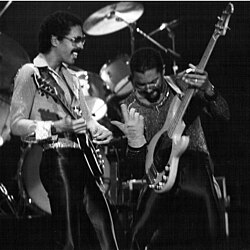The Brothers Johnson
The Brothers Johnson were an American funk and disco duo that recorded several successful albums in the second half of the 1970s.
History
The brothers George ( born May 17, 1953 in Los Angeles ) and Louis Johnson ( born April 13, 1955 in Los Angeles ) established already as a student their first band Johnson Three Plus One, in which even her older brother Tommy and their cousin Alex Weir played along. The band accompanied artists such as Bobby Womack and The Supremes on their concert tours. Johnson Three Plus One broke up in 1971 when George and Louis Johnson changed the backing of Billy Preston. Weir later worked as a guitarist for the Talking Heads and the Tom Tom Club.
When George and Louis Johnson 1973 Preston's band left again, they were already established songwriter and session musician. In 1974 she played in Quincy Jones ' band on its U.S. tour. Jones became the mentor of the Johnson brothers. They played in 1975 on his album Mellow Madness, to which she contributed four compositions.
In 1976, Quincy Jones Brothers Johnson for the label A & M Records. He produced her debut album Look out for # 1, the number 9 on the Billboard 200 and the top spot of R & B Album Charts. In the same year her single I'll Be Good to You reached # 1 on the R & B singles chart and # 3 on the Hot 100
1977 was followed by the album Right on Time with the Top 5 hit Strawberry Letter # 23 written by Shuggie Otis The title was later used several times as a sample in other titles, including the single Ms. Jackson OutKast. For the instrumental track Q The Brothers Johnson were awarded the 1978 Grammy Award. Came Right on Time only at # 2 on the R & B album charts, as The Brothers Johnson In 1978 with their third album Blam! again a number -one hit.
Published in 1980, The album Light up the Night was the last collaboration of The Brothers Johnson with Quincy Jones. The first single from the album, Stomp! was the biggest hit of the band, in addition to a number-one ranking in the R & B and dance charts, reaching the title top 10 rankings among other things, on the Billboard Hot 100, the UK Top 40 and Norway. The title was also the only number -one hit of the Brothers Johnson in the New Zealand Top 40 and the only hit in the charts (No. 24). Further noteworthy to Light up the Night was the composition This Had to Be who wrote the Brothers Johnson with Michael Jackson. Jackson can also be heard in the background.
The success of the Light Light Up The Brothers Johnson could with her first self-produced album, which released in 1981 Winners, not repeat them. Due to the involvement of Toto Jeff Porcaro musician (drums ), Steve Porcaro ( synthesizer ), Steve Lukather (guitars ) and David Paich (keyboards), the album had become clear rock -heavy. A year later, the brothers split to achieve solo projects. Louis Johnson released a gospel album and was a guest musician on a sought after bassist. So he worked with, among others, Michael Jackson's albums Off the Wall, Thriller and Dangerous and Aretha Franklin Through the Storm. George Johnson also worked as a session musician, including for Steve Arrington.
During the 1980s, it always came back to reunions of the brothers. 1984 Leon Sylvers produced the album Out of Control, 1988 followed by the album Kickin ' with the brothers but missed the one chart position. In addition, Louis and George Johnson were still active together as a composer. In 1989, she co-wrote with Siedah Garrett the title Tomorrow for Quincy Jones ' album Back on the Block, on which Jones also with Ray Charles and Chaka Khan had the Brothers Johnson I'll Be Good to You Title gecovert.
After The Brothers Johnson had appeared only sporadically together in the 1990s, a longer joint tour followed in 2002 in the United States.
Discography
Albums
Single Hits
- Is It Love That We're Missing ( Quincy Jones feat. Brothers Johnson) # 70 U.S. pop charts in 1975
- I'll Be Good To You # 3 U.S. pop charts in 1976
- Get The Funk Outa Ma Face # 30 U.S. pop charts in 1976
- Strawberry Letter 23 # 5 U.S. Pop charts in 1977
- Stomp # 7 U.S. Pop charts in 1980
- Treasure # 73 U.S. pop charts in 1980
- The Real Thing # 67 U.S. pop charts in 1981










